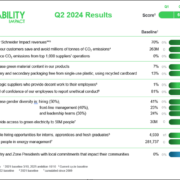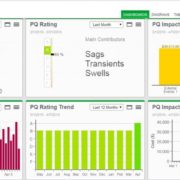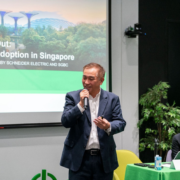Nine Out of 10 Singapore Companies Not Fully Measuring Scope 3 Emissions

A joint study by Schneider Electric and the Institute of Singapore Chartered Accountants (ISCA), the national accountancy body of Singapore, reveals that 94 percent of Singapore organisations are not fully measuring and analysing Scope 3 emissions, which is impacting the readiness to report.
Launched today, the report titled “Counting to 3: Navigating Singapore’s Emissions Journey Together”, analyses the perspectives of over 500 of Singapore’s senior business leaders involved in sustainability strategies for their organisation. These leaders represent companies ranging in size from small and medium-sized enterprises (SMEs) to large multinational corporations and come from a broad range of industries.
The report comes ahead of new requirements for all listed companies and large non-listed companies in Singapore to make climate-related disclosures from 2025 and 2027, respectively.
Starting Point is a Distinct Lack of Knowledge
Only 39 percent of respondents claim to have a strong understanding of Scope 3 emissions, which is overall much lower than for Scope 1 (52 percent) and 2 (34 percent). This gap is significant among less senior team members: 58 percent of board members and 51 percent of C-level executives claim strong knowledge of Scope 3, while only 27 percent of senior managers report the same.
Differences are also seen based on roles and responsibilities, with 47 percent and 42 percent of those in General Management and Sustainability roles saying they have a strong knowledge of Scope 3, while only 33 percent of those in Operations & Supply chain say the same.
Respondents cite the correlation between greater seniority and greater knowledge exists due to senior executives having increased access to briefings on emissions management and strategies. However, the importance of knowledge being equally distributed across all functions and divisions within organisations was also emphasised, as change management programmes require both strategic understanding coupled with the capability to implement the step changes needed for Scope 3 reporting requirements in Singapore.
Knowledge Deficits Linked to Inaction
While over three quarters (76 percent) of business leaders say they have completed feasibility studies to better understand their organisation’s readiness to measure, report, and manage its Scope 3 emissions, only 6 percent say their organisation is fully measuring and analysing Scope 3 emissions, lagging significantly behind Scope 1 (52 percent) and Scope 2 (30 percent) emissions.
As a result, confidence in meeting their Scope 3 emissions targets is significantly lower, with only 27 percent believing these are highly achievable, compared to 40 percent for Scope 1 and 31 percent for Scope 2 emissions. Leaders from larger businesses are significantly more likely to indicate they have set targets for Scope 3 (54 percent) compared with those at small businesses at 31 percent.
In further findings, only 32 percent believe their organisation’s net zero targets are achievable, but in a show of optimism 64 percent of those whose organisations have not yet set emissions targets believe they should have done so. Business leaders who adopted science-based targets (SBTis) were more likely to drive meaningful action within their organisations, helping define a clear and credible path to sustainability success.
Four Groups of Organisations Identified Based on Scope 3 Progress
The report identifies four groupings of organisations in Singapore with progress around managing Scope 3 emissions and the degree of management required: high adopters (10 percent), moderate adopters (30 percent), low adopters (38 percent), and emerging adopters (22 percent). From this analysis, the industries in Singapore identified as containing the highest proportion of high and moderate adopters combined are consumer goods, energy and mining, healthcare and pharmaceuticals, financial services and engineering and construction.
Expertise, Resources, Motivation and Tech are Key Progress Barriers
Overall, a lack of human and financial resources, commercial motivation, and access to fit-for-purpose technological infrastructure are highlighted by respondents as the top barriers to progressing Scope 3 emissions reduction agendas and initiatives.
However, there are differences in impact, based on segment status. For instance, while high and moderate adopters identify a lack of human resources or expertise as the biggest barrier to reducing Scope 3 emissions, low adopters and emerging adopters cite a lack of technological infrastructure as the biggest.
Yoon Young Kim, Cluster President, Schneider Electric Singapore and Brunei said, “Scope 3 presents the next frontier of emissions management and still unchartered territory for many organisations in Singapore. Education is critical for advancing Singapore’s green agenda. We see correlations throughout the findings of this study that a lack of understanding of key areas of management of greenhouse gas (GHG) emissions leads to a lower level of planning, target setting, and ultimately action.
“At Schneider Electric, we are deeply committed to meaningful and thorough emissions management, and we are constantly growing our capacity to help partners strategise, digitise, and decarbonise. But as with all initiatives to tackle climate change, everyone needs to be in lockstep on this journey: government and private sector businesses of all sizes and across all industries. Schneider Electric, together with ISCA, hopes this report shines a light on the most pressing areas that must be addressed if we are to make the changes that will facilitate Singapore’s path to net zero.”
Accountants are Poised to Play Key Role in Sustainability Reporting
Accountancy and finance professionals are well-placed to take on the role of sustainability reporting. As corporate reporters, they already have fundamental skills in financial reporting. They are also familiar with applying accounting standards and ensuring that reporting is transparent, verifiable, comprehensive, independent, and fair. In addition, accountancy and finance professionals are proficient in data collation and analysis to provide meaningful explanations for informed decision-making. These skillsets are transferable to sustainability reporting, including Greenhouse Gas scope 3 reporting.
Kang Wai Geat, Divisional Director, Professional Standards, ISCA said, “Sustainability is a megatrend that is reshaping the accountancy profession. Increasingly, organisations are turning to the accountancy profession for sustainability reporting and assurance. To take full advantage of the opportunity to help organisations advance their emissions agenda, accountants must upskill and reskill to keep up with the latest developments in sustainability.
“The accountancy profession is key to reporting sustainability performance to shed light on how companies earn their profits. Having consistent and comparable sustainability reporting will help stakeholders make informed decisions in support of sustainability. ISCA is delighted to collaborate with Schneider Electric to delve deeper into GHG scope 3 emissions management and reporting.”








